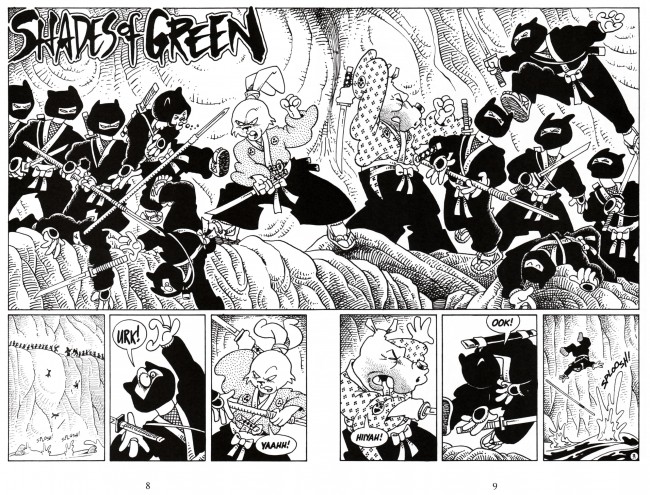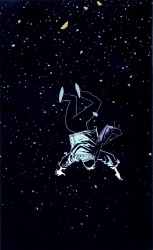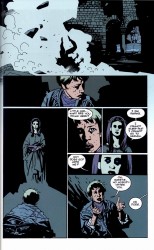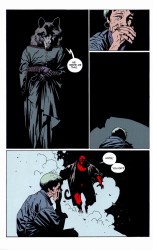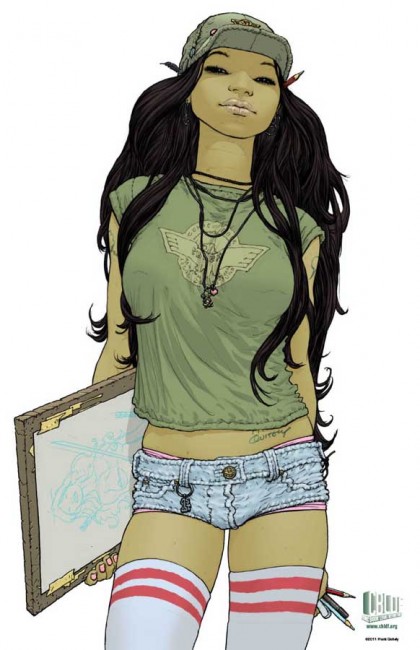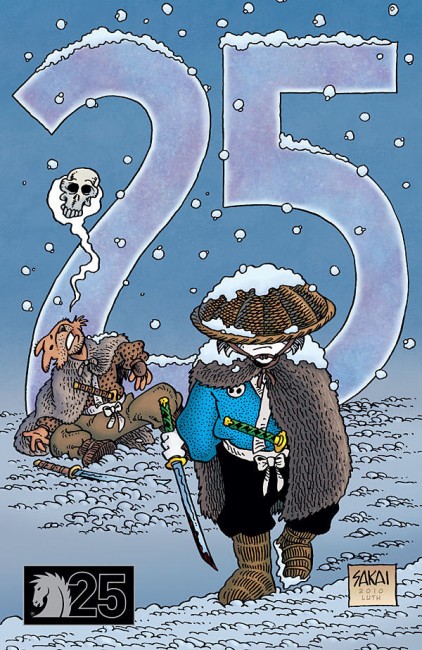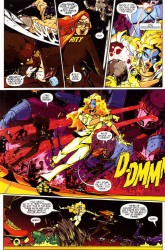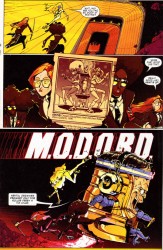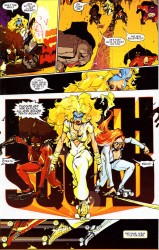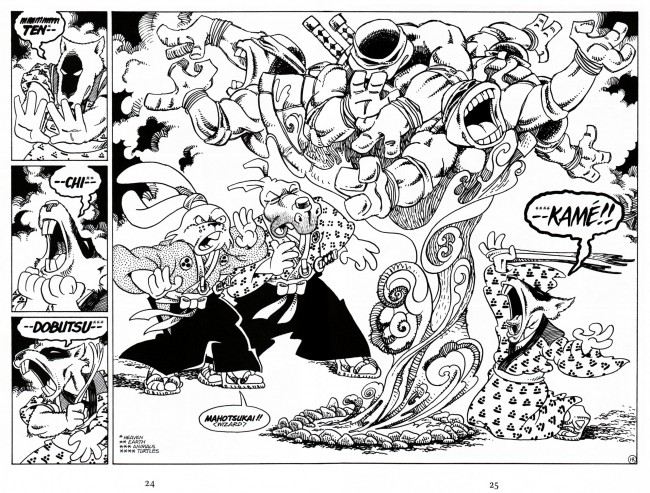
Stan Sakai’s Usagi Yojimbo is probably the most consistently good comic currently being published.
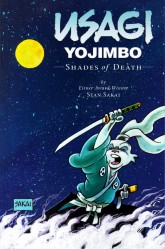 If I were on the outside looking in, I wouldn’t expect myself to like Usagi Yojimbo. There’s not a lot of space for casually brutal violence, curse words, and femmes fatale in funny talking animal comics, y’know? But, no– it turns out that this book is right up my alley. Sakai isn’t trying to tell some continuity-tangled epic or reinvent an old genre. He just wants to tell chambara tales, and he created a character and a world that’s flexible enough to support anything he wants to do. I don’t think I’ve ever read a volume of Usagi Yojimbo that I disliked.
If I were on the outside looking in, I wouldn’t expect myself to like Usagi Yojimbo. There’s not a lot of space for casually brutal violence, curse words, and femmes fatale in funny talking animal comics, y’know? But, no– it turns out that this book is right up my alley. Sakai isn’t trying to tell some continuity-tangled epic or reinvent an old genre. He just wants to tell chambara tales, and he created a character and a world that’s flexible enough to support anything he wants to do. I don’t think I’ve ever read a volume of Usagi Yojimbo that I disliked.
The first Sakai book I read, or at least read knowing it was Stan Sakai, was Usagi Yojimbo 8: Shades of Death . I picked it up on a whim maybe six or seven years ago off a vague inkling that I liked when Usagi Yojimbo showed up on the old Teenage Mutant Ninja Turtles cartoon. It turns out that blind luck got me the volume where the Ninja Turtles guest star for a story arc. The story is the kind that shouldn’t work–full of magic, time travel, and a crossover between two franchises, but it absolutely comes together in the end.
. I picked it up on a whim maybe six or seven years ago off a vague inkling that I liked when Usagi Yojimbo showed up on the old Teenage Mutant Ninja Turtles cartoon. It turns out that blind luck got me the volume where the Ninja Turtles guest star for a story arc. The story is the kind that shouldn’t work–full of magic, time travel, and a crossover between two franchises, but it absolutely comes together in the end.
Shades of Death is actually a pretty good cross-section of what Sakai is capable of. Other than the TMNT story, he does a brief story about Usagi as a child, one where Usagi gets trapped in the intrigue of a small village (“Shi”), and a funny short about Usagi and some tokage lizards. There’s a mix of mysticism, samurai action, horror, and just plain old comedy, and none of it seems out of place.
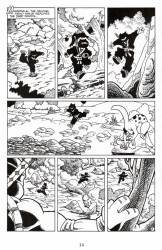
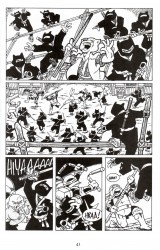
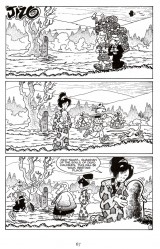
The Ninja Turtles story was good, but “Shi” is fantastic. In it, Usagi randomly wanders into a village after tossing a stick at a crossroads and letting the gods decide his fate (remember Yojimbo?). He ends up in the middle of a magistrate’s plot to steal a bunch of gold from a village. Usagi is forced to defend the village from four assassin’s collectively known as “Death,” or “Shi.”
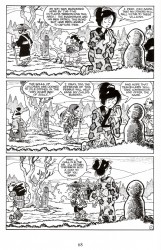
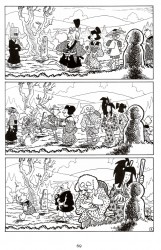
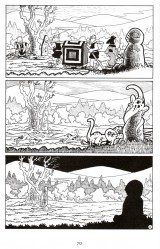
When the time comes to kill the assassins, Usagi and Sakai do not shy away from the violence. It’s shown without ever dipping into exploitation, but it remains exciting. Usagi dispatches the villains one-by-one, and Sakai’s clean linework and layouts keep the action interesting. After the battle, when confronted with a man from the village who wants to prove his worth, Usagi effectively puts him down with simple words. Sakai draws Usagi with an off-kilter stance and overly-shadowed face, ramping up the menace, and it’s as effective on the page as it is in the story. You get the feeling that Usagi’s blood is still running hot and that bothering him right then would definitely be a mistake.
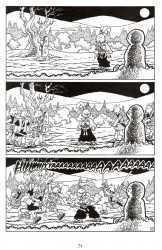
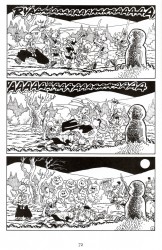
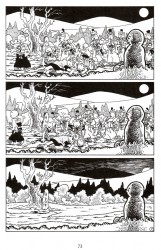
On the other end of the spectrum, and directly after “Shi,” is “The Lizard’s Tale.” This short story wouldn’t be out of place in a Looney Tunes short or goofy Saturday morning cartoon. Usagi wakes up to find himself surrounded by tokage lizards, who then proceed to imprint upon him and follow him around, defying his best efforts to get rid of them. This is a largely dialogue-less piece, unless you count the sounds of the lizards, but you don’t really need words to make this work. It uses Tom & Jerry storytelling to get the job done.
Sakai’s never had a problem with telling stories in Usagi Yojimbo. There are a couple of bits that he picked up from movies, such as Usagi’s leap out of a window to dodge an arrow or using a still camera for an entire story to great effect, but by and large, Usagi Yojimbo is just made up of solid cartooning. The stories draw their inspiration from a variety of films. The most notable references/homages are from Akira Kurosawa’s chambara pictures, as I can think of a couple of Yojimbo riffs off the top of my head, but Sakai’s done a pretty deft (but goofy) Godzilla strip, too.
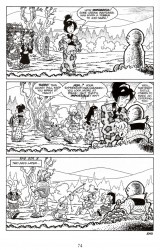
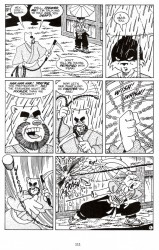
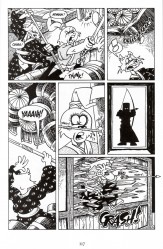
Usagi is one of those books I binge on a few times a year. I’ll hit Amazon and pick up several volumes, tear through them in a few short days, and then wait. Usagi Yojimbo is Grab Bag Comics, the sort of series where you know you’ll get something you’ll enjoy, but have no idea which genre you’re going to get it in. Sakai’s interested in telling simple stories, tales you can drop in on whenever you like and get something good. Usagi Yojimbo is dependably good, and I’m having trouble thinking of a series that’s matched its run. That’s something to be respected in the modern comics industry, I think.
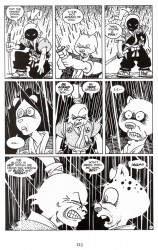
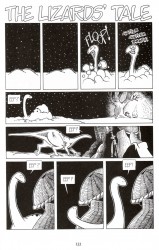
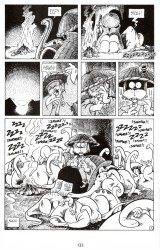
Of course, after writing this, I noticed that the volume I spent this entire essay praising is currently out of print. You can find it used for pretty cheap , or you can preorder the new edition
, or you can preorder the new edition for 01/2011. Honestly, though, if you want a taste of Usagi, you should start with last year’s Usagi Yojimbo: Yokai
for 01/2011. Honestly, though, if you want a taste of Usagi, you should start with last year’s Usagi Yojimbo: Yokai . It’s a short original graphic novel about the time Usagi wandered into a demon-infested forest. It’s maybe a little more serious than the average Usagi tale, but it’s nicely spooky and seeing full-color Sakai is pretty great. After that, jump around in the series. The reading order isn’t essential the way it is in a continuity-focused comic, and Sakai is great at getting you caught up without loading up on infodumps.
. It’s a short original graphic novel about the time Usagi wandered into a demon-infested forest. It’s maybe a little more serious than the average Usagi tale, but it’s nicely spooky and seeing full-color Sakai is pretty great. After that, jump around in the series. The reading order isn’t essential the way it is in a continuity-focused comic, and Sakai is great at getting you caught up without loading up on infodumps.
